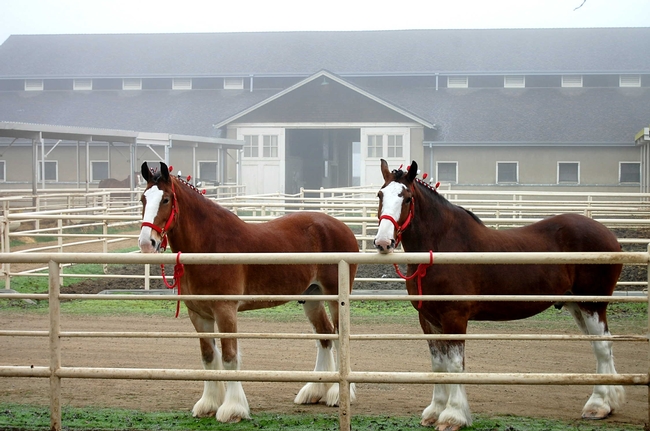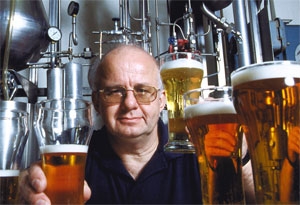
Posts Tagged: Bamforth
Have a Few Crickets With Your Kölsch
These things go together: Ham and eggs, macaroni and cheese, and beer and bugs. Beer and bugs? Definitely! Haven't you ever had a few crickets with your Kölsch? Well, you will if you attend the Robert Mondavi Institute for Wine and Food Science's event, "Bugs and Beer—Why Crickets and...

Would you eat honey bee larvae? (Photo by Kathy Keatley Garvey)

Wax moth larvae: good source of protein? And throw in a few small hive beetles for good measure? (Photo by Kathy Keatley Garvey)
Is beer sacred? One man thinks of it that way
On a recent Sunday night I went to see Charles Bamforth, the University of California's only professor of brewing, speak at Sudwerk Riverside in Folsom, hosted by the Sacramento Chapter of the UC Davis Alumni Association. The standing-room-only banquet room had an empty seat next to a winemaker and a food scientist; a married couple who came back early from a weekend in Santa Cruz for some edutainment and local brew. Bamforth can pack ‘em in on most of his speaking venues.
Bamforth teaches in the UC Davis food science department. Brewing is fermentation science, which is a food science, and Bamforth’s book on Beer and Health is proof that beer is indeed food. He claims beer is better for health than wine — a point he loves to argue with the wine professors at the Robert Mondavi Institute of Wine and Food Science. That is where his shiny new sustainable brewery was installed by Anheuser Busch.
Bamforth’s favorite movie is, not surprisingly, “How Beer Saved the World.” You can watch it free online in 43 minutes without commercials. As he likes to point out, unlike water, almost no one gets sick from beer. “When is the last time you heard of a beer recall?” he quipped with a grin. If people are worried about illness from eating fruits or vegetables, he suggested they should wash them in beer.
Bamforth likes to share a chuckle over another bit of history. While reading the memoirs of former Chancellor Emil Mrak he learned that Mrak never got permission from the UC Regents to start the UC Davis brewing program in 1958. Maybe after the University of Wisconsin turned down the brewers association when they offered to fund the program there Mrak was wise enough not to ask permission.
As the third UC Davis brewing professor, Bamforth brought British expertise and his own comedic sensibilities. He punctuates brewing science with artful trivia on British, German and Flemish brewing traditions. It is easy to see why his general education classes on beer and brewing are the second largest on campus. (The largest is the formidable favorite, Human Sexuality, but when Playboy magazine published their higher education issue this year it was the brewing class, not sexuality, they featured.) Guest lecturers for his class include the brewing celebrities Fritz Maytag, former owner of San Francisco’s historic Anchor Steam, and Ken Grossman of Sierra Nevada Brewing.
Comedic timing aside, Bamforth also has a serious side. He handles the typical questions with ease, such as, “Why is most American beer so flavorless compared to craft brews?” (He frequently reminds us that the best selling beer is Bud Light.) He compared weather in California to England’s, and reminded us that a light beer is a thirst quencher on hot days and a better pairing for spicy Thai curry and cheesy Mexican cuisines. Bamforth says that neutral beer is more difficult to make consistently — fewer flavors to hide the defects or mask regional differences.
Bamforth’s newest book title, Beer Is Proof God Loves Us: Reaching for the Soul of Beer and Brewing, is a spoof on the Ben Franklin quote, Wine is proof God loves us. If Bamforth had his way, beer would be more revered than wine for its role in human history. He doesn’t care for silliness like beer pong or ridiculous commercials portraying drinking as one-upmanship. He teaches mindfulness and its role in responsible drinking. Drinking beer properly involves a bit of ceremony as meaningful as pouring tea. He instructs us that beer should always be poured into a perfectly clean glass, one that has not had any fingers inside on its trip to the table. There should be a foam head after the perfect pour. Maybe a whispered “Thank you, God” before the first sip would make a nice addition to the ceremony as well.
For more information:
- Courses in food science
- Interviews with Bamforth on Public Radio
- How Beer Saved the World
- UC Davis Brewing and Food Science Laboratory and Winery
- Sudwerk Riverside in Folsom

The skinny on beer

Why? Because most of the calories in alcoholic beverages are in the alcohol and wine typically has a higher alcohol content than beer. “The higher the alcohol content in any drink, the more calories it contains,” says Bamforth, the Anheuser-Busch Endowed Professor of Malting and Brewing Sciences.
He contends beer has gotten a bad rap about belly bloating for too long. “For years beer has been blighted by a reputation for being more fattening than other alcoholic drinks when in reality the exact opposite is true," he says. "It really irritates me when I hear the words ‘empty calories’ attached to beer. That's utter nonsense.”
In fact, beer is loaded with stuff that’s good for you. According to Bamforth, there are significant levels of some of the B vitamins in beer — folic acid, for instance — as well as minerals and fiber. “Let me tell you that beer is pretty much the richest source of silica in the diet,” he says. “Detailed studies in the United Kingdom have linked that to bone health. Beer also contains antioxidants such as ferulate.”
And then there's the alcohol itself. The majority of folks worldwide who study the link between moderate alcohol consumption and reduced risk of coronary heart disease are now convinced that the active ingredient is alcohol and not some other component of alcoholic beverages, he adds. So beer is just as effective as wine in this context.
"Now don't get me wrong. I enjoy wine,” Bamforth confides. “But I know that if I want to be genuinely intrigued by an alcoholic drink, then there is much more going on in the world of beer. There’s such a vast array of styles. Something for the depths of winter — perhaps an Imperial stout — to the balmy days of summer — a sparkling lighter lager. All enjoyed in moderation, of course.”
You would expect a professor of brewing sciences to promote ales and lagers as the drink of choice, especially on a hot summer day: “Ya'll better believe me, because beer truly is best.”
Got a question, comment, or request for more information from the beer professor? E-mail him at cwbamforth@ucdavis.edu.
